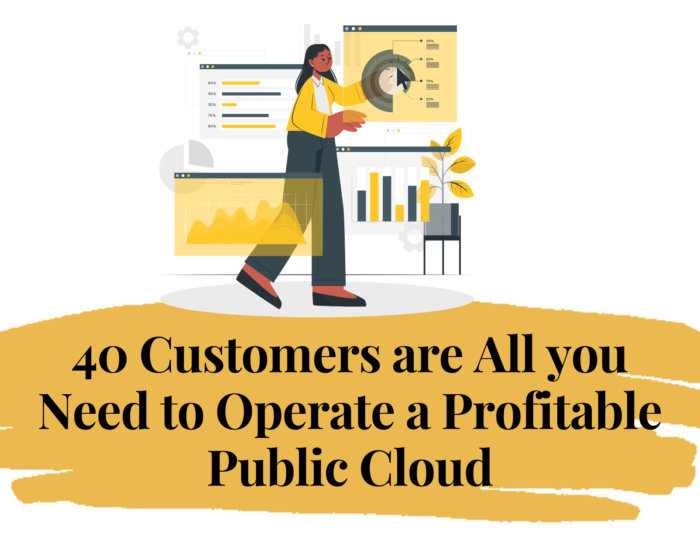Cloud computing is a buzzword in business circles and everyone wants a piece of the pie. With the increase in cloud computing usage around the world and the cloud industry growing, it is obvious that the cloud is a great business opportunity to leverage. Everyone wants to start a cloud business because it can be highly profitable and scalable.
There are two different aspects to starting a cloud business – the technology and the business aspect. Mostly, people start by focusing on the technology part. To make sure they have the latest tech and the best facilities.
We have a different point of view.
We prefer to focus on the business aspect first. In the complexity of setting up a public cloud business and all the technical needs, we often forget the eventual goal – breaking even fast and scaling to make profits. That’s what keeps a business running and gives you the flexibility to focus on improving technology and everything that runs in the background.
As a business, you should be focused on the end goal. Have a plan. Look into it – can your sales team identify 40 potential customers for you? Are these existing customers or someone new? What will your sales process look like? These are the things to consider first before moving on to the technology part or doing it in the background.
The Numbers First
As mentioned above, we suggest focusing on the business aspect first. First, calculate the breakeven point for your business. Why? Because breakeven is important. If you can create a quick break-even in a business vertical – anything that follows is a bonus. While other factors are important, no one likes losing money.
Second, evaluate and shortlist potential customers. In our experience, you can reach breakeven and operate a profitable business with 40 customers only.
Here’s how:
| Customer type | Minimum VM requirements | Number of Customers | Total Vms | Who? |
| SOHO business | 2 | 30 | 60 | Startup community / Individual developers |
| Medium Business | 5 | 8 | 40 | Healthcare / Retail / Education / Manufacturing |
| Large enterprise | 10 | 2 | 20 | Government / Large conglomerates / BFSI |
With 120 average-sized VMs (4 vCPU Cores, 16GB of memory and 256GB of SSD storage) you are looking at monthly revenues of anywhere between $9,600 to $12,000. These numbers are usually enough to break even considering the various recurring costs to run such a service. We at Indiqus work with prospects to create a high-level business plan that includes detailed calculations. To know more contact us here
The other side and what usually goes wrong
Setting up a public cloud might feel like a mammoth job. There are multiple aspects to look after – choice of technology, talking to vendors, setting up a business plan, etc. It is important to take note of these aspects as they determine the success of your business.
While most people know what to look for before starting a cloud business, not everyone understands the exact planning or execution which goes into building a cloud business. Usually, there is a standard story amongst all the new public cloud businesses – long timelines owing to the complex nature of the business and its setup.
Usually, setting up a public cloud business can look like this:
- Planning – 3 months
- Procure hardware – 4 months
- Cloud setup – 2 months
- Integration with legacy systems – 6 months
While you are busy managing the project and setting up your cloud business, many things can change.
Maybe your company’s management changes and the new one isn’t exactly on board with the existing set-up. Maybe your team changes and it takes time to get everything back in sync. Maybe the customers are unhappy with their existing services and need something fast.
But, while these are variables, here are common reasons for a lot of failed cloud initiatives:
- Too much focus on technology. Going on and on about which is the best, which is the cheapest, and which is the most popular, might not be the ideal solution.
- Project Delay – Time overruns are one of the more common issues when setting up a complex project such as a cloud business
- Inflexible vendors. As discussed above, inflexible vendors can put you in a pickle very easily. And they might cost you your money, time, reputation, and customer success.
There are things you can do to avoid these pitfalls. Here’s what we think –
How to set up a public cloud business – our take
- Choose simple technology that addresses the widest use case: Technology can be a black hole. It can get as complex as you want and as simple as you want. You can choose complex tech for your business – spend a lot of time with it. Or you can choose a simple tech that will take care of most of your use cases. Choosing the simple one saves time and effort that you can spend to market and grow your business.
- Look at the architecture that does not lock you in: Easy-to-use and customizable architecture which can constantly change according to your and your customer’s need is the one you should go for. While there can be a lot of tempting options, it’s again best to keep it simple and something that doesn’t lock you in. This way you don’t need to design it again for a different customer.
- Look at cost optimization on the technology stack to be competitive: When it comes to building a business, it is important to optimize your costs and save where you can. For example, at IndiQus we use open-stack technology for us and our customers. This keeps the cost low and the chances of customization high.
- Short turnaround time for setup: Don’t fall for the long timelines and endless loops when it comes to setting up a business. Again, keep in mind – the time you invest in set-up can be utilized for business enablement.
- Scalable and flexible solution: As mentioned above, the best solution or business setup is something which is customizable – flexible and scalable. Flexibility ensures no time wastage when addressing a new use case and scalability ensures not wasting time when your business starts to grow.
How can IndiQus help you?
At IndiQus, we make your public cloud set up an easy and flexible process. Here’s what we offer:
- Single Vendor Solution – Single Point of Contact / Single SLA / Complete responsibility
- A cloud CMP for end-to-end management of both customer and administrator workflows
- Integrated billing, ticketing and monitoring with the ability to plug into the legacy system
- 24x7x365 managed service for everything with an SLA
- Consulting and advisory for ALL aspects of a cloud business
- Focus on open source for cost optimization
- Delivered as managed service with flexibility to develop your own expertise – 0 vendor lock-in
- No technology or manpower risk
- No additional cost for business enablement or advisory – single monthly price for everything
- 8-week Delivery
Our clients focus on developing the business and we make sure everything else works. To know more book a free demo with us!

With 13+ years of experience in business development, general management, and operations, Rishab brings his learnings from industries such as internet services, FMCG and industrial goods to Apiculus. A graduate of the Indian School of Business, he handles overall business operations at Apiculus focusing on partnerships, alliances, marketing and sales.

